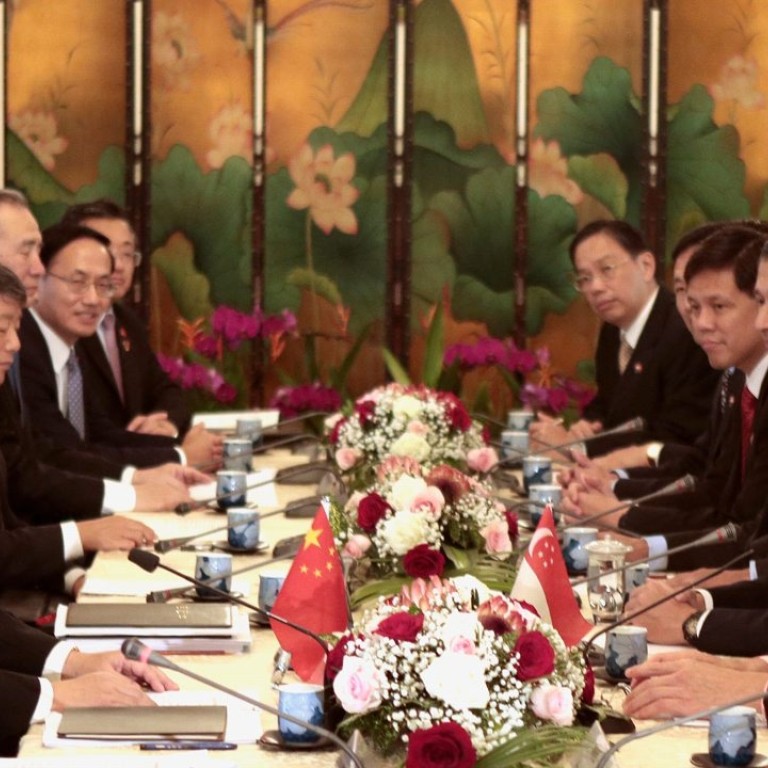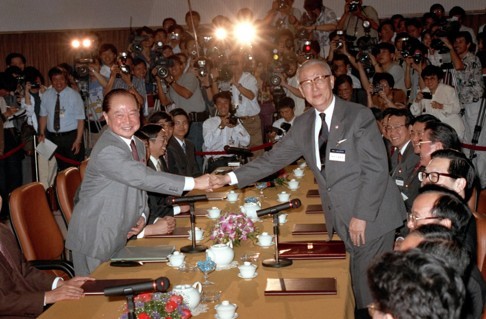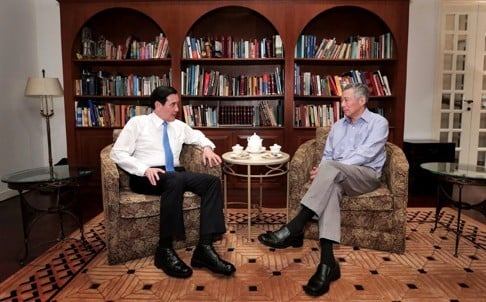
A trusted friend to both Beijing and Taipei, Singapore was the natural choice for historic Xi-Ma cross-strait summit
Du Ping says Beijing and Taipei are put at ease by cultural affinity, Singapore’s neutral stance in cross-strait relations and its leaders’ skilled diplomacy and understanding of the issues
To both mainland China and Taiwan, Singapore is a blessed place. In April 1993, Wang Daohan and Koo Chen-fu, the respective heads of government-sanctioned organisations from each side of the Taiwan Strait, held their first talks in the city state. The groundbreaking talks marked the beginning of peaceful engagement between the two erstwhile enemies of a bloody civil war.
Twenty-two years after those talks, President Xi Jinping (習近平) met Taiwan’s president, Ma Ying-jeou, in Singapore – the first such summit in 66 years.
READ MORE: Full coverage of the Xi-Ma summit
So why did the leaders choose Singapore for their political rendezvous? Much has been said about Singapore’s impartiality towards both sides of the strait. But that’s not the whole reason. Practically all East Asian countries adhere to the “one China” diplomatic stance, and therefore stand neutral in cross-strait affairs.
Without offering something unique, Singapore would have no role to play.
Apart from being impartial, Singapore has never been aloof about China-Taiwan affairs. It has been a devoted and trusted friend to both Beijing and Taipei, and it is this that makes it stand out.

But there are more important aspects to Singapore’s uniqueness.
Most people in both places usually feel comfortable with Singapore, and their leaders can feel at home there without any sense of cultural alienation
Singaporean leaders have an unparalleled and deep understanding of the complex situation, and their demonstrated goodwill, understated diplomacy and sophisticated manoeuvring skills, are reassuring for leaders in Beijing and Taipei.
This has much to do with then senior minister Lee Kuan Yew, who facilitated the Wang-Koo meeting. His masterful handling of that event won Singapore an irreplaceable role in cross-strait relations.
Now, this legacy is being carried forward by his son, Prime Minister Lee Hsien Loong. After the death of the elder Lee, many in Singapore were concerned that, without a respected elder statesman like Lee Kuan Yew, Singapore would lose its diplomatic lustre in the region.
In his later years, Lee Kuan Yew himself also conceded that Singapore’s role would become irrelevant since Beijing and Taiwan were directly talking to each other regularly. That is why Singapore was surprised by the decision for Xi and Ma to meet there.

For Prime Minister Lee, the Xi-Ma meeting was also, to some extent, a rehabilitation. In 2004, Lee, then the deputy prime minister, angered China by visiting Taiwan and was strongly criticised for “meddling in China’s internal affairs”. But now, everything is different. On Saturday evening, after the Xi-Ma meeting, Lee had a private chat with Ma and posted their photo on his Facebook page. Beijing seemed totally at ease with their intimate encounter.
READ MORE: Tea and pastries after making history: Taiwan’s president thanks Singapore for hosting historic presidential summit with Xi Jinping
I would even say the summit is Beijing’s way of rewarding Singapore for its positive role in cross-strait relations. It is also an acknowledgement by Beijing that Singapore is a strong partner in regional affairs. This has been highlighted by the fact that, while Singapore chose to host the Wang-Koo meeting in 1993, it was chosen as the venue for the Xi-Ma meeting this time.
Du Ping is a senior political commentator with Hong Kong Phoenix Satellite Television
